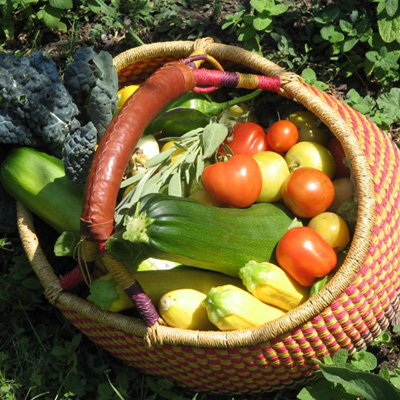Growing food is an important step toward self sufficiency, at the personal individual scale as well as at the small group, neighborhood, community, city and bio-regional scales. The Urban Farm is a model for productive urban land use where people grow food, work together, take care of the land, and build community. Throughout its history, the Urban Farm has been a place and a process which integrates biological, ecological, economic and social concerns.
The goal of the Urban Farm is to teach students how to learn about nature through working. The class is offered spring, summer and fall terms. The activities of the Farm vary seasonally but are primarily hands-on with some lectures and field trips. Students will learn about the importance of caring for the soil, various organic gardening practices and techniques, composting, permaculture, biodynamic agriculture, and agricultural land issues.
The Farm demonstrates different methods of growing food and various composting methods. We are influenced by and teach about several main gardening philosophies: NW French Raised Bed Biointensive (Chadwick/Jeavons), Steve Solomon, and Ruth Stout.
There are usually 80 people at the Farm in the class, so we divide the class into 6 groups of a team leader and about 13 students. The main Farm area around the circle is divided into six areas, so that every group has a ‘home’ place in the heart of the farm. The idea is to share the responsibility for the beds and to work together as a team in planning and working. Saturday sessions work on the common areas of the farm: the circle, ‘the back 40’, the orchards, the composting area, the raspberries, the herb beds, and the greenhouse.
Students are assigned one written test and one five-page book report in addition to two more experiential assignments. Most recently, the experiential assignments have been an ‘Eat Local’ assignment and ‘Do Some Cooking’ assignment.
The interim director of the Urban Farm is Harper Keeler. Feel free to email him at hkeeler at uoregon.edu for more information about the farm. You can also feel free to show up during our volunteer hours on Saturdays from 10:30-12:30. Chances are we have an extra pitch fork and lots of work to be done!


